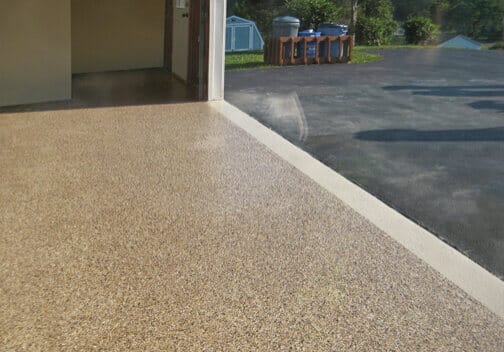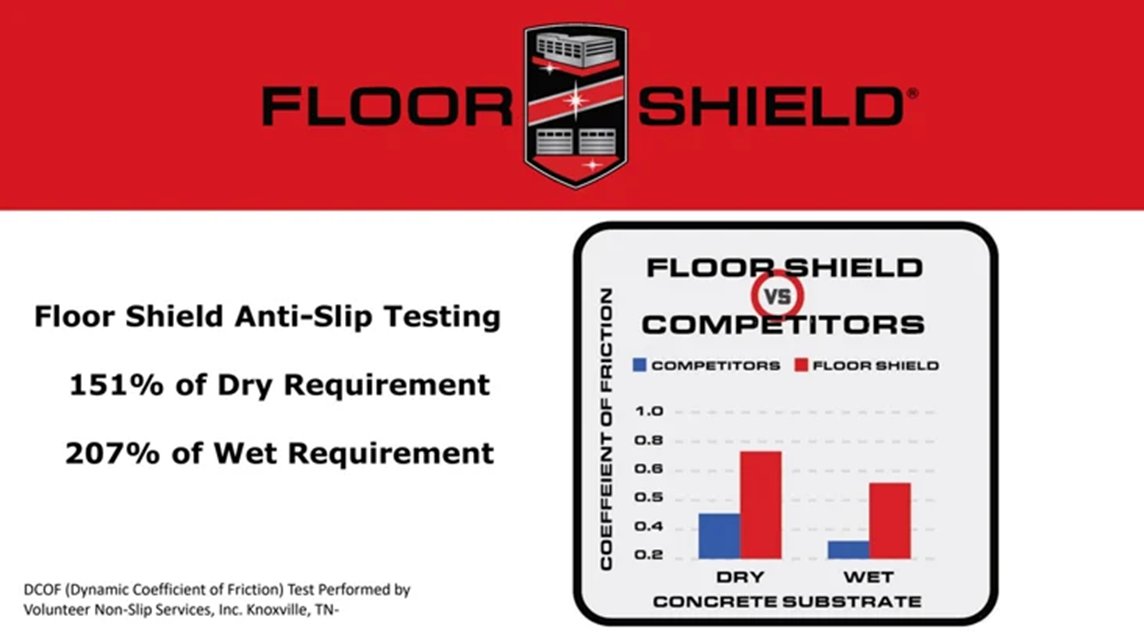Are Concrete Coatings Worth It? Exploring Types, Prices, and Alternatives
March 19th, 2024 | 5 min. read
By Admin

Concrete coatings have revolutionized the world of flooring, offering a plethora of benefits that can transform dull and vulnerable concrete surfaces into durable, aesthetically pleasing, and safe spaces. Whether you're considering coating your garage floor, patio, or commercial space, the decision to invest in concrete coatings is a significant one.
At Floor Shield, we’ve been coating concrete for years and get asked all the time, “How much better are concrete coatings compared to other floor covering options?” and “What are the differences in price?”
In this comprehensive guide, we'll delve into these questions honestly and explore the different concrete coatings types, prices, alternatives, and ultimately answer the question: Are concrete coatings worth it?
Types of Concrete Coatings and Their Differences
Concrete coatings come in various types, each designed to cater to specific needs and environments. Understanding the differences between these coatings is crucial in making an informed decision.
Epoxy Coatings:
Composition: Epoxy coatings are a combination of epoxy resin and a hardening agent that chemically react to form a rigid, durable surface.
Characteristics: Known for their high chemical resistance and durability, epoxy coatings offer a smooth, glossy finish that will transform the appearance of concrete surfaces.
Applications: Ideal for areas with high traffic such as garage floors, warehouses, and industrial spaces.
Polyurea Coatings:
Composition: Polyurea coatings are elastomers derived from the reaction of an isocyanate component and a resin blend.
Characteristics: These coatings are renowned for their flexibility, impact resistance, and rapid curing times, making them suitable for environments with temperature fluctuations.
Applications: Commonly used in industrial settings, automotive facilities, and areas requiring a fast return to service.
Polyaspartic Coatings:
Composition: A type of aliphatic polyurea, polyaspartic coatings are derived from the reaction of an isocyanate component and a resin blend.
Characteristics: Offering high chemical resistance, UV stability, and excellent durability, polyaspartic coatings are versatile and suitable for both interior and exterior applications.
Applications: Widely used in garage floors, retail spaces, and outdoor surfaces due to their even faster cure times than polyurea and long-lasting finish.
Understanding the differences in composition and characteristics of these coatings can help you choose the one that best suits your needs and budget.
Price of Different Concrete Coatings Options
The cost of concrete coatings varies based on several factors, including the type of coating, square footage, surface preparation, and additional customization options. Here's a general overview of the price range for each type:
Epoxy Coatings:
Average Cost: $3 to $10 per square foot.
Factors Affecting Cost: Quality of epoxy, number of coats, size of the area, surface preparation.
Polyurea Coatings:
Average Cost: $6 to $8 per square foot.
Factors Affecting Cost: Thickness of the coating, size of the area, and condition of the concrete.
Polyaspartic Coatings:
Average Cost: $6 to $9 per square foot.
Factors Affecting Cost: UV protection, color options, surface texture.
While these costs may seem higher than alternatives, such as concrete staining, sealing, or painting, the durability and longevity of concrete coatings often make them a cost-effective investment in the long run.
However, keep in mind that options like concrete paint are much easier to do yourself than installing a concrete coating. With the latter, the installation process is far too complex to handle without the proper experience and equipment. Options like concrete paint are readily available to buy as kits in most home-improvement retail stores. While lower-grade epoxies are also available to buy for DIY use as well, we highly discourage this, as the longevity is not worth the price. It won’t last much longer than an acrylic coating.
Concrete Coatings Alternatives and Their Prices
While concrete coatings offer numerous benefits, there are alternatives worth considering, each with its own price range and characteristics:
Concrete Staining:
Average Cost: $2 to $10 per square foot.
Characteristics: Penetrates the concrete pores, creating a unique and natural look.
Applications: Often used for decorative purposes in residential and commercial spaces.
Concrete Sealing:
Average Cost: $0.50 to $2.50 per square foot.
Characteristics: Protects against stains, moisture, and simplifies cleaning.
Applications: Commonly used for outdoor surfaces such as driveways and patios.
Acrylic Coatings (concrete paint):
Average Cost: $2 to $5 per square foot.
Characteristics: Water-based coatings with minimal texture, grip and protection.
Applications: Suitable for decorative purposes but may lack durability in high-traffic areas.
Polished Concrete:
Average Cost: $2 to $16 per square foot.
Characteristics: Polishing concrete is a multi-step process that involves grinding, honing, and polishing the surface to achieve the desired level of smoothness and shine.
Applications: The final appearance and characteristics of the polished concrete depend on factors such as:
- The quality of the original concrete mix
- The degree of grinding and polishing applied.
- Any additional treatments like densifiers and sealers.
Floor Tiles:
Average Cost: $7 - $10 per square foot
Characteristics: Tiles come in various types with varying degrees of quality, including:
- Vinyl
- Porcelain
- Wood
- Plastic
Applications: Cheaper options like vinyl tiles simply require adhesive for installation. Grout is unnecessary for them to securely stick to the floor, making vinyl tiles a popular choice for DIY projects.
On the other hand, Porcelain tiles, often considered a premium option, provide luxurious flooring at a higher cost. However, all types of tiles face common issues such as susceptibility to breakage due to their rigid composition. This vulnerability is especially notable in outdoor settings, where the ground is prone to shifting and cracking due to natural tectonic movements.
Are Concrete Coatings Worth It?
The decision to invest in concrete coatings ultimately depends on your priorities and the specific requirements of your space. Here are some key factors to consider:
Durability and Longevity:
Concrete coatings offer superior durability compared to alternatives like staining or sealing. They provide a protective layer that enhances resistance to abrasion, chemicals, and impact. With proper installation and maintenance, coatings can last for several years without the need for frequent reapplication.
Our Floor Shield product is a 100% polyaspartic concrete coating that is built to last. We offer a 15-year, non-prorated warranty to ensure our customers can believe in its longevity too. Some of the factors that influence this longevity are:
- Completely UV Stable
- Super adhesion
- Unmatched abrasion resistance
- High-quality silica color flake options
- Excellent stain resistance (including hot tire pickup)
Aesthetics:
If you're looking to enhance the appearance of your concrete surface, coatings offer a wide range of color options, finishes, and textures. Whether you prefer a glossy finish or a more textured surface with colored flakes, coatings can transform the look of your space.
Safety:
Slip resistance is a crucial consideration for any flooring surface. Concrete coatings, especially polyaspartic coatings, can be engineered to provide excellent slip resistance, reducing the risk of accidents.
The national standard for a non-slip floor is typically set at 0.42, meaning that on a non-slip floor, at least 42% of one's weight must be converted into grip between the shoes and the floor. Polished concrete floors, however, often boast coefficients of friction ranging from 0.49 to 0.59, depending on the installation details. This significant increase in slip resistance makes polished concrete floors 20% to 50% more slip-resistant than the national standard for a low-slip floor.
Floor Shield surpasses these numbers significantly. When we tested our 100% polyaspartic concrete coating under OSHA, our results came in as follows:

Return on Investment:
Investing in high-quality concrete coatings can significantly enhance the appeal and value of your property. Whether it's for your home or a commercial space, the improved aesthetics and durability can contribute to a higher resale value.
Conclusion
Concrete coatings offer a range of benefits that make them a worthwhile investment for many property owners. The durability, aesthetics, safety, and long-term cost-effectiveness of these coatings often outweigh the initial investment. Whether you choose epoxy, polyurea, polyaspartic, or another type of coating, the key is to prioritize quality installation and maintenance to maximize the lifespan of your coated surface.
If you are willing to spend more money on the professional installation of a concrete coating, it is a worthwhile investment that will last at least a few years. However, if the upfront cost is not in your budget, cheaper options like concrete sealing or concrete painting might be better alternatives. Though, they only last a couple of years max.
When exploring your options, consider consulting with professionals to assess your specific needs and budget. Ultimately, concrete coatings can provide a durable, attractive, and long-lasting solution for a variety of residential, commercial, and industrial spaces. Make an informed decision based on the unique requirements of your project.
If you’d like to get a free quote for Floor Shield’s polyaspartic concrete coating, fill out the form below.
